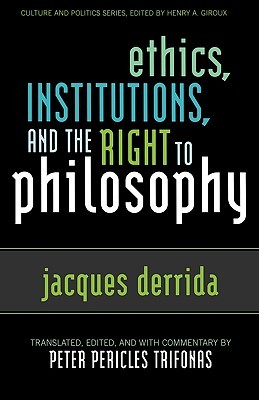
- We will send in 10–14 business days.
- Author: Jacques Derrida
- Publisher: Rowman & Littlefield Publishers
- ISBN-10: 0742509036
- ISBN-13: 9780742509030
- Format: 16.2 x 21.6 x 1 cm, minkšti viršeliai
- Language: English
- SAVE -10% with code: EXTRA
Ethics, Institutions, and the Right to Philosophy (e-book) (used book) | bookbook.eu
Reviews
Description
This new book reflects Derrida's latest views on the role of education and international organizations in an era of globalization. In this book, Derrida develops a notion of the global citizen that is uniquely post-Kantian. He looks especially at the changing role of UNESCO and similar organizations at a time when individual and national identities, knowledge and commerce, and human rights all are brought to world attention in new ways than they have been in the past. Following Derrida's writings on these issues, prominent scholars engage in a dialogue with him on his approach to understanding the ethics of international institutions and education today.
EXTRA 10 % discount with code: EXTRA
The promotion ends in 23d.19:52:41
The discount code is valid when purchasing from 10 €. Discounts do not stack.
- Author: Jacques Derrida
- Publisher: Rowman & Littlefield Publishers
- ISBN-10: 0742509036
- ISBN-13: 9780742509030
- Format: 16.2 x 21.6 x 1 cm, minkšti viršeliai
- Language: English English
This new book reflects Derrida's latest views on the role of education and international organizations in an era of globalization. In this book, Derrida develops a notion of the global citizen that is uniquely post-Kantian. He looks especially at the changing role of UNESCO and similar organizations at a time when individual and national identities, knowledge and commerce, and human rights all are brought to world attention in new ways than they have been in the past. Following Derrida's writings on these issues, prominent scholars engage in a dialogue with him on his approach to understanding the ethics of international institutions and education today.


Reviews